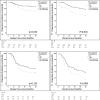Prognostic Significance of Post-Operative Morbidity Severity Score After Potentially Curative D2 Gastrectomy for Carcinoma
- PMID: 29766446
- PMCID: PMC6132392
- DOI: 10.1007/s11605-018-3787-9
Prognostic Significance of Post-Operative Morbidity Severity Score After Potentially Curative D2 Gastrectomy for Carcinoma
Abstract
Background: Survival and relapse after gastric cancer surgery are largely attributed to tumor biology and surgical radicality; yet, other prognostic factors have been reported, including respiratory sepsis and anastomotic leakage, but not global morbidity severity score (MSS). The hypothesis tested was that MSS would be associated with both disease-free (DFS) and overall survival (OS).
Methods: Consecutive 373 patients undergoing potentially curative surgery for gastric adenocarcinoma between 2004 and 2016 in a UK cancer network were studied. Complications were defined prospectively as any deviation from a pre-determined post-operative course within 30 days of surgery and classified according to the Clavien-Dindo severity classification (CDSC). Primary outcome measures were DFS and OS.
Results: Post-operative complications were identified in 127 (34.0%) patients, which was associated with 9 (2.4%) post-operative deaths. Five-year DFS and OS were 35.9 and 38.5% for patients with a post-operative complication compared with 59.5 and 61.5% in controls (p < 0.001, p = 0.001, respectively). On multivariable DFS analysis, post-operative morbidity [hazard ratio (HR) 1.63, 95% confidence interval (CI) 1.06-2.50, p = 0.026] was independently associated with poor survival. On multivariable OS analysis, post-operative morbidity HR 2.25 (95% CI 1.04-4.85, p = 0.039) and CDSC HR 1.76 (95% CI 1.35-2.29, p < 0.001) were independently associated with poor survival. These associations were also observed in patients with TNM stage I and II disease with morbidity HR 7.06 (95% CI 1.89-26.38, p = 0.004) and CDSC HR 2.93 (95% CI 1.89-4.55, p < 0.001) offering independent prognostic value.
Conclusion: Post-operative CDSC was an important independent prognostic factor after potentially curative gastrectomy for carcinoma associated with both DFS and OS. Prehabilitation strategies to minimize complications are warranted.
Keywords: Complications; Gastric cancer; Morbidity; Survival.
Conflict of interest statement
The authors declare that they have no conflict of interest.
Figures


References
-
- Richards CH, Platt JJ, Anderson JH, McKee RF, Horgan PG, McMillan DC. The impact of perioperative risk, tumor pathology and surgical complications on disease recurrence following potentially curative resection of colorectal cancer. Ann Surg. 2011;254:83–9. doi: 10.1097/SLA.0b013e31821fd469. - DOI - PubMed
-
- Andreou A, Bieb lM, Dadras M, Struecker B, Sauer IM Thuss-Patience PC, Chopra S, Fikatas P, Bahra M, Seehofer D, Pratschke J, Schmidt SC. Anastomotic leak predicts diminished long-term survival after resection for gastric and esophageal cancer. Surgery 2016; 160: 191–203. 10.1016/j.surg.2016.02.020. - PubMed
-
- National Oesophago-Gastric Cancer Audit Progress Report 2014 (NOGCA 2014) An Audit of the care received by people with Oesophago-Gastric Cancer in England and Wales. 2014. Available from: http://www.augis.org/wp-content/uploads/2014/05/NOGCA-PROGRESS-Report-20... [Accessed 27th October 2017].
MeSH terms
LinkOut - more resources
Full Text Sources
Other Literature Sources
Medical

